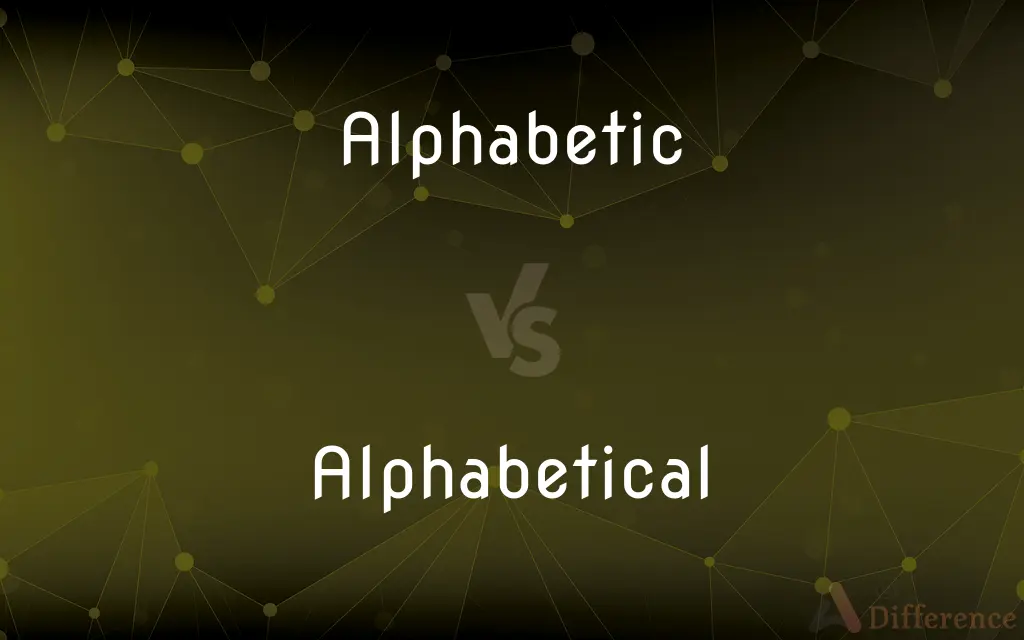Alphabetic vs. Alphabetical — What's the Difference?
By Tayyaba Rehman & Urooj Arif — Updated on April 3, 2024
Alphabetic order organizes items based on the full set of letters, while alphabetical refers specifically to the order of the letters within the alphabet.

Difference Between Alphabetic and Alphabetical
Table of Contents
ADVERTISEMENT
Key Differences
Alphabetic and alphabetical both relate to the arrangement or order based on the letters of the alphabet, yet they have nuanced differences in usage and context. Alphabetic order typically refers to a system or arrangement that uses all the letters in the alphabet, often emphasizing the inclusion or consideration of every letter. On the other hand, alphabetical order more specifically denotes the sequence of the letters within the alphabet itself. It is commonly used to describe the ordering of words or names by comparing the letters sequentially from the first to the last.
While both terms imply a sequence based on the alphabet, alphabetic sometimes carries a broader sense, potentially involving all the letters in a system or sequence. This can be seen in contexts such as alphabetic languages, which are those that use a set of symbols representing sounds to form words, in contrast to logographic languages, where each character represents a word or morpheme. Alphabetical order, in contrast, is more strictly concerned with the literal order of letters within the alphabet, making it a critical principle in organizing information in a way that is easily accessible and universally understood.
In educational settings, the distinction becomes clearer. Teachers may introduce young learners to the alphabetic principle, which is the understanding that there are systematic and predictable relationships between written letters and spoken sounds. Here, the focus is on the alphabet as a whole and its role in literacy. Meanwhile, teaching students to arrange words in alphabetical order is a specific application of this principle, focusing on the sequential order of letters to organize words in a list or directory.
Moreover, in computer science, alphabetic sorting algorithms might deal with the technical nuances of sorting strings of characters in an array or list, where the term "alphabetic" could imply a broader consideration of character sets, including not just the basic English alphabet but also extended and international characters. Alphabetical sorting, while also used in this context, often refers specifically to simpler cases of sorting according to the basic Latin alphabet.
In the creation of indexes or bibliographies, the difference is applied in the meticulous organization of entries. An alphabetic system might be used to categorize entries under each letter broadly, whereas alphabetical ordering is essential for the fine-grained sorting of each entry within those categories, ensuring users can find specific information quickly.
ADVERTISEMENT
Comparison Chart
Definition
Refers to systems or arrangements using all alphabet letters.
Specifically denotes the sequence of letters within the alphabet.
Context
Often used in broader systems like alphabetic languages.
Commonly applied in sorting words or names in lists.
Focus
Emphasizes the inclusion of every letter.
Concentrates on the precise order of letters.
Application
In educational contexts, relates to understanding written sounds.
Essential for organizing information, e.g., in dictionaries.
Examples
Alphabetic filing system, alphabetic languages.
Alphabetical list, alphabetical order in a dictionary.
Compare with Definitions
Alphabetic
Involving the foundational elements of written language.
Learning the alphabetic principles is crucial for literacy.
Alphabetical
Pertaining to the order of the letters within the alphabet.
The names were arranged in strict alphabetical order.
Alphabetic
Relating to the system of characters used in writing based on an alphabet.
The alphabetic code of English consists of 26 letters.
Alphabetical
Used to describe the sequence in which letters appear.
Alphabetical sorting is key in creating an accessible index.
Alphabetic
Pertaining to the arrangement or inclusion of all the letters in the alphabet.
An alphabetic list ensures every item is filed under the corresponding initial letter.
Alphabetical
Involving the comparison of letters to organize words or entries.
Alphabetical order is taught early in school to help with dictionary use.
Alphabetic
Broadly applying to categorizations that involve the alphabet.
The library used an alphabetic system to organize books.
Alphabetical
Specific to the method of arranging according to the standard letter sequence.
The cookbook sections are listed in alphabetical order for ease of use.
Alphabetic
Encompassing all aspects of the alphabet in a system or method.
The software's alphabetic sorting feature includes special characters.
Alphabetical
Referring to the detailed organization of items based on the first letter followed by subsequent letters.
Her contacts are meticulously organized in alphabetical order.
Alphabetic
Arranged in the customary order of the letters of a language.
Alphabetical
Arranged in the customary order of the letters of a language.
Alphabetic
Of, relating to, or expressed by an alphabet.
Alphabetical
Of, relating to, or expressed by an alphabet.
Alphabetic
Of or relating to an alphabet, especially the characters A to Z, both uppercase and lowercase.
Alphabetical
Pertaining to, furnished with, or expressed by letters of the alphabet.
Alphabetic
Pertaining to, furnished with, expressed by, or in the order of, the letters of the alphabet; as, alphabetic characters, writing, languages, arrangement.
Alphabetical
According to the sequence of the letters of the alphabet.
All names were placed into an alphabetical list.
Alphabetic
Literal.
Alphabetical
(obsolete) literal
Alphabetic
In alphabetical order.
Alphabetical
Relating to or expressed by a writing system that uses an alphabet;
Alphabetical writing system
Alphabetic
Relating to or expressed by a writing system that uses an alphabet;
Alphabetical writing system
Alphabetical
Arranged in order according to the alphabet;
An alphabetic arrangement
Dictionaries list words in alphabetical order
Alphabetic
Arranged in order according to the alphabet;
An alphabetic arrangement
Dictionaries list words in alphabetical order
Common Curiosities
How does alphabetical order work?
Alphabetical order sorts words or names by comparing the sequence of letters from the first to the last, following the specific order of letters in the alphabet.
How is alphabetic order used in computer science?
In computer science, alphabetic sorting algorithms can deal with sorting strings of characters, considering both basic and extended international characters.
Is there a difference in application between alphabetic and alphabetical?
Yes, alphabetic may refer to broader systems or the inclusion of all letters, while alphabetical focuses on sorting words or names according to letter sequence.
Can alphabetic and alphabetical be used interchangeably?
While often used interchangeably, alphabetic can have a broader implication, whereas alphabetical specifically refers to the sequence of letters in the alphabet.
Why is alphabetical order important?
Alphabetical order is essential for organizing information in a manner that is universally understood and easily accessible, such as in dictionaries or indexes.
What is alphabetic order?
Alphabetic order refers to a system or arrangement that organizes items based on the first letter of their title, considering every letter of the alphabet.
Can alphabetic refer to languages?
Yes, alphabetic languages are those that use a set of symbols (letters) representing sounds to form words, as opposed to logographic languages.
What is the alphabetic principle?
The alphabetic principle is the understanding that written letters and spoken sounds have systematic and predictable relationships, foundational in literacy.
What is the significance of alphabetical order in dictionaries?
Alphabetical order allows for the precise and efficient location of words, making dictionaries more user-friendly and accessible.
How do educational settings differentiate between alphabetic and alphabetical?
Educational settings might introduce alphabetic principles as foundational literacy concepts, whereas teaching alphabetical order is a specific organizational skill.
How do alphabetic sorting algorithms handle international characters?
Alphabetic sorting algorithms can be designed to consider the full range of international characters, extending beyond the basic Latin alphabet.
What makes alphabetical order a fundamental organizational tool?
Its universality and simplicity make it a fundamental tool for organizing words in a sequence that facilitates easy location and reference.
Share Your Discovery

Previous Comparison
Drypoint vs. Etching
Next Comparison
Arduous vs. OrdealAuthor Spotlight
Written by
Tayyaba RehmanTayyaba Rehman is a distinguished writer, currently serving as a primary contributor to askdifference.com. As a researcher in semantics and etymology, Tayyaba's passion for the complexity of languages and their distinctions has found a perfect home on the platform. Tayyaba delves into the intricacies of language, distinguishing between commonly confused words and phrases, thereby providing clarity for readers worldwide.
Co-written by
Urooj ArifUrooj is a skilled content writer at Ask Difference, known for her exceptional ability to simplify complex topics into engaging and informative content. With a passion for research and a flair for clear, concise writing, she consistently delivers articles that resonate with our diverse audience.














































